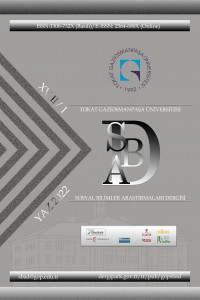Öz
Hanif Kureishi is an author of multicultural origin with multi-layered cultural accumulations. He takes up various identity issues in his works through a kind of hybrid storytelling mingled with numerous autobiographical references. His fictional characters bear great similarities not only to himself but also to his family members. This characteristic of his fiction is observed in his latest work The Last Word (2013) as well. In this novel, some specific events and memories can be related to his individual experiences. However, these are in disguise either as the memories of Harry, a would-be biographer who pins his hopes on a biographical work, or Mamoon, an eminent postcolonial author who is losing his fame. Kureishi cryptically confesses his own experiences in his novel, which makes this novel autocritographic in nature. Autocritography is briefly defined as a self-reflexive discursive strategy. There is a general sense of autobiographical references in such works, and thus it has a crucial narrative potential, especially for those marginalized and cast out of the society. It allows Others to narrate their stories. They voice out their stance and identity in society. This study will analyse Kureishi’s specific tale-telling as an autocritography by which he voices out his concerns, which will also contribute to our understanding of the novel.
Anahtar Kelimeler
Autocritography Kureishi other cryptical disguise identity The Last Word
Kaynakça
- Awkward, Michael. (1999), Scenes of Instruction: A Memoir, Duke University Press, USA
- Bhabha, Homi K. (1990), “DissemiNation: Time, Narrative, and the Margins of the Modern Nation,”Nation and Narration. Ed. Homi K Bhabha. London: Routledge.
- Hall, Stuart. (2015), “New Ethnicities” Critical Dialogues in Cultural Studies, edt by David Morley and Kuan-Hsing Chen, Routledge, London.
- Huddart, David. (2007), Postcolonial Theory and Autobiography, Routledge, London.
- Kaleta, Kenneth C. (1998), Hanif Kureishi: Postcolonial Storyteller, University of Texas Press, USA.
- Kureishi, H., (1986), The rainbow signs. In: My beautiful laundrette and the rainbow sign. Faber & Faber, London.
- 2013. My Ear at His Heart: Reading My Father, Scribner, USA.
- 2014. The Last Word. Faber and Faber Press, London.
- Leith, William. (1997), “Sex, Drugs and a Mid-Life Crisis” The Observer, “Life”, 23 March, pp 6-8.
- Moore-Gilbert, Bart. (2001), Hanif Kureishi, Manchester University Press, UK
- Ranasinha R. (2018), Moore-Gilbert on Kureishi. Interventions 20(1): 123–26.
- Sharmani Patricia Gabriel & Edmund Terence Gomez & Zarine Rocha, (2012), “Between policy and reality: multiculturalism, the second generation, and the third space in Britain”, Asia Europe Journal, 12 Vol. 10/ 4. 10:267–285 DOI 10.1007/s10308-012-0337-, Springer-Verlag Berlin Heidelberg.
- Tekin, Kuğu. (2020), “Hanif Kureishi’s The Last Word: The Art of Fictional Biography”, CUJHSS, June; 14/1: 51-61.
- Thomas, S. (2005), Hanif Kureishi: A Reader’s Guide to Essential Criticism. Basingstoke: Palgrave Macmillan.
- Wenshu Lee. (2003), “Kuaering Queer Theory: My Autocritography and a Race-Conscious, Womanist, Transnational Turn" Journal of Homosexuality, vol 45, pgs 143-170
- Yousaf N. (2002), The Buddha of Suburbia: A Reader’s Guide. New York: Continuum.
Öz
Hanif Kureishi, çok katmanlı kültürel birikimlere sahip çok kültürlü bir yazardır. Eserlerinde çeşitli kimlik meselelerini, sayısız otobiyografik referansla harmanlanmış bir tür melez hikâye anlatımı üzerinden tema olarak alır. Kurgusal karakterleri sadece kendisiyle değil, aile üyeleriyle de büyük benzerlikler taşır. Kurgusunun bu özelliği, son eseri The Last Word de(2013) de görülmektedir. Bu romandaki bazı özel olaylar ve anılar onun bireysel deneyimleriyle ilişkilendirilebilir. Bununla birlikte, bunlar ya umutlarını biyografik bir çalışmaya adayan bir biyografi yazarı olan Harry'nin ya da ününü kaybetmekte olan seçkin bir sömürge sonrası yazar olan Mamoon'un anıları olarak gizlenmiştir. Kureishi, romanında kendi deneyimlerini şifreli bir şekilde itiraf eder, bu da bu romanı doğası gereği otokritografik hale getirir. Otokritografi kısaca özdüşünümsel bir söylemsel strateji olarak tanımlanabilir. Bu tür eserlerde genel bir otobiyografik gönderme duygusu vardır ve bu nedenle özellikle marjinalleştirilen ve egemen toplumun dışında bırakılanlar için çok önemli bir anlatı potansiyeline sahiptir. Ötekilerin hikayelerini anlatmasına izin verir. Bu nedenle, bu çalışma, Kureishi'nin endişelerini dile getirdiği bir otokritografi olarak kendine özgü hikâye anlatımını analiz edecektir.
Anahtar Kelimeler
Kaynakça
- Awkward, Michael. (1999), Scenes of Instruction: A Memoir, Duke University Press, USA
- Bhabha, Homi K. (1990), “DissemiNation: Time, Narrative, and the Margins of the Modern Nation,”Nation and Narration. Ed. Homi K Bhabha. London: Routledge.
- Hall, Stuart. (2015), “New Ethnicities” Critical Dialogues in Cultural Studies, edt by David Morley and Kuan-Hsing Chen, Routledge, London.
- Huddart, David. (2007), Postcolonial Theory and Autobiography, Routledge, London.
- Kaleta, Kenneth C. (1998), Hanif Kureishi: Postcolonial Storyteller, University of Texas Press, USA.
- Kureishi, H., (1986), The rainbow signs. In: My beautiful laundrette and the rainbow sign. Faber & Faber, London.
- 2013. My Ear at His Heart: Reading My Father, Scribner, USA.
- 2014. The Last Word. Faber and Faber Press, London.
- Leith, William. (1997), “Sex, Drugs and a Mid-Life Crisis” The Observer, “Life”, 23 March, pp 6-8.
- Moore-Gilbert, Bart. (2001), Hanif Kureishi, Manchester University Press, UK
- Ranasinha R. (2018), Moore-Gilbert on Kureishi. Interventions 20(1): 123–26.
- Sharmani Patricia Gabriel & Edmund Terence Gomez & Zarine Rocha, (2012), “Between policy and reality: multiculturalism, the second generation, and the third space in Britain”, Asia Europe Journal, 12 Vol. 10/ 4. 10:267–285 DOI 10.1007/s10308-012-0337-, Springer-Verlag Berlin Heidelberg.
- Tekin, Kuğu. (2020), “Hanif Kureishi’s The Last Word: The Art of Fictional Biography”, CUJHSS, June; 14/1: 51-61.
- Thomas, S. (2005), Hanif Kureishi: A Reader’s Guide to Essential Criticism. Basingstoke: Palgrave Macmillan.
- Wenshu Lee. (2003), “Kuaering Queer Theory: My Autocritography and a Race-Conscious, Womanist, Transnational Turn" Journal of Homosexuality, vol 45, pgs 143-170
- Yousaf N. (2002), The Buddha of Suburbia: A Reader’s Guide. New York: Continuum.
Ayrıntılar
| Birincil Dil | İngilizce |
|---|---|
| Bölüm | Research Article |
| Yazarlar | |
| Yayımlanma Tarihi | 30 Haziran 2022 |
| Gönderilme Tarihi | 18 Nisan 2022 |
| Kabul Tarihi | 22 Mayıs 2022 |
| Yayımlandığı Sayı | Yıl 2022 Cilt: 17 Sayı: 1 |
Kaynak Göster

Bu eser Creative Commons Atıf 4.0 Uluslararası Lisansı ile lisanslanmıştır.


